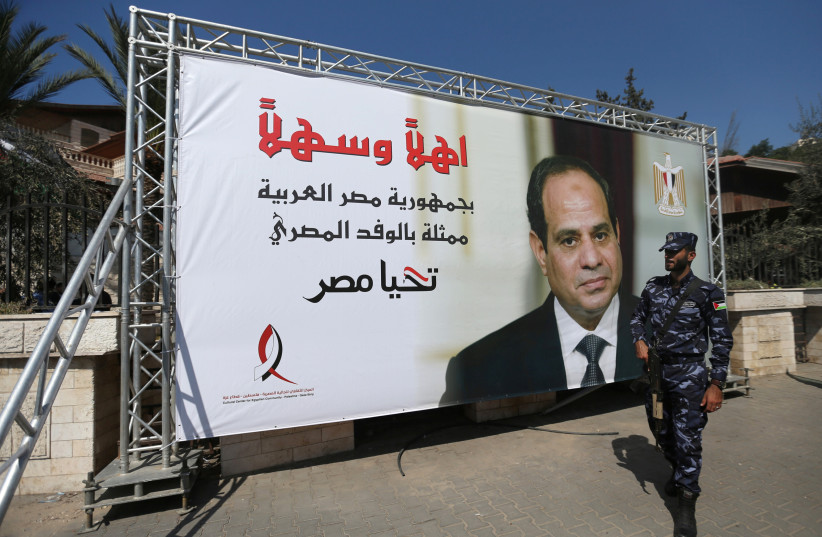Cairo and Jerusalem are at odds over the Egyptian-brokered truce that ended the Gaza violence earlier this month. The fragile quiet on Israel’s southern border is dependent on a hastily reached truce fraught with confusion.
It could fray as quickly as it was formed, leaving Israel a hairsbreadth away from renewed violence, just as the IDF’s attention is focused on Lebanon and Iran in the north.
Shin Bet head Ronen Bar met with Egyptian intelligence chief Abbas Kamel in Cairo earlier this week in an attempt to clarify the terms of the truce.
“Perhaps something was lost in translation,” explained former Zionist Union MK Ksenia Svetlova on Wednesday.
“The Egyptians feel hurt. They feel like they lost face,” said Svetlova. “This is something that you do not want to do in the Middle East. They promised something they could not live up to and Israel better correct it soon.”

"The Egyptians feel hurt. They feel like they lost face. This is something that you do not want to do in the Middle East. They promised something they could not live up to and Israel better correct it soon."
Former Zionist Union MK Ksenia Svetlova
“In Gaza, we can depend only on Egyptians for negotiations and brokering the peace deals,” she added. Svetlova is a senior non-resident fellow at Atlantic Council and Mitvim Institute for Regional Foreign Policy.
What's the deal with Israel and Egypt?
Relations between Israel and Egypt had improved in the last year, with strengthening economic, security and tourism ties. However, there were still a number of issues that arose even prior to the Gaza violence earlier this month.
Tel Aviv University lecturer Ofir Winter explained that the Egyptians were embarrassed by several reports that appeared in the Israeli media prior to the August violence.
This included a June report that IDF fighter jets had shot down an unarmed Egyptian drone that crossed into Israeli airspace. The drone shooting was coordinated, but Egypt would have preferred that it not be publicized.
In another incident, the media reported in July that a mass grave of Egyptian soldiers killed during the Six Day War had been uncovered near Latrun in Israel.
Israel, in addition, did not coordinate with Egypt its killing of Palestinian Islamic Jihad commanders Tayseer al-Jabari and Khaled Mansour in Gaza, said Winter, who is a researcher at Tel Aviv University’s Institute for National Security Studies.
Mansour’s killing complicated Egypt’s efforts to broker a truce, he added, explaining that Israel had claimed these assassinations crucial in preventing future terror attacks.
In a virtual briefing Winter gave to reporters through the Jerusalem-based Media Central, he laid out the points of contention between Israel and Egypt in respect to the truce.
Israel has ignored Egyptian President Abdel Fattah al-Sisi’s request that the IDF reduce its West Bank raids against Palestinian suspects and terrorists, so that Egypt could stabilize the cease-fire, Winter said. Instead, he added, the IDF has continued its West Bank military operations.
Then there is the issue of imprisoned PIJ leader Bassam al-Saadi and detainee Khalil Awawda, who is on a hunger strike.
Egypt, as part of its efforts to secure a truce, told the PIJ that “it would work [for the] release of two prisoners,” Winter explained. It was a pledge that made it easier for the PIJ to accept a cease-fire.
“It was given without consent from Israel. It caused an ambiguity regarding the fate of these prisoners,” Winter said, adding that this led to a different set of expectations among the parties to the truce, which has contributed to the current wedge between Jerusalem and Cairo.
“Egypt found itself under pressure from the PIJ to deliver what it promised,” and Cairo is now pressing Israel on that matter, Winter said.
He added that it was his belief that it had been a mistake to negotiate solely with the PIJ and to not involve Hamas. Operation Breaking Dawn had not targeted Hamas, which has forcibly ruled the Gaza Strip since it ousted Fatah in a bloody coup in 2007.
This one was different
Past Gaza wars have been between the IDF and Hamas. Operation Breaking Dawn is one of the few violent outbreaks that have solely involved the PIJ.
The absence of Hamas as a party to the truce means that it has no responsibility to intervene, Winter said.
“Now, we see the PIJ is still threatening to renew violence if its conditions are not met, while Hamas is relatively free from the obligation to restrain the PIJ,” Winter said.
Former ambassador to Egypt Dr. Haim Koren stressed that “Sisi is a very important regional player” and “ally.” He is very “devoted to the mediation” over Gaza and Israel has “a good understanding with him.”
“The relationship with Egypt under him is the best we have ever had,” said Koren, who is a lecturer at Reichman University and is affiliated with the Mitvim Institute.
Sisi has been the lead negotiator in every Gaza truce since 2014. “We always emphasize the role of Egypt in every negotiation,” he explained.
In past negotiations, Egypt held indirect mediations between Israel and Hamas, but these talks differed in that they were held with the PIJ with the involvement of Qatar.
“When you have more than one mediator, there might be misunderstandings,” Koren said.
The situation, however, has not reached the level of crisis and is likely to be smoothed over. “I think we can bridge the gaps. It is in the interests of all sides to do so,” Koren added.
